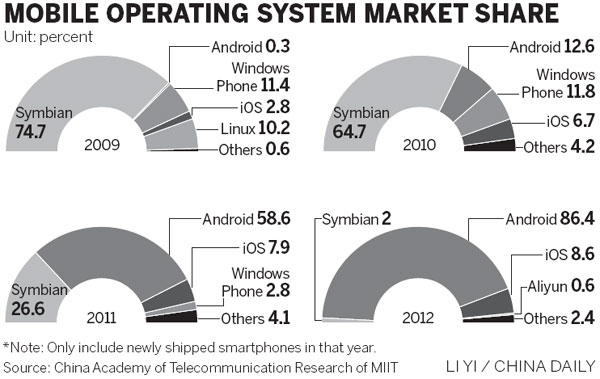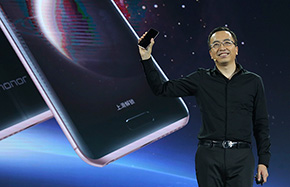Local smartphone developers could face unfair competition

China's smartphone market is heavily dependent on overseas operating system developers like Google Inc and Apple Inc, and this supremacy could have local developers facing unfair competition, according to a government think tank.
"Google strictly controls the core technologies, and Chinese companies are under constant threat of business discrimination from the US company," said the China Academy of Telecommunication Research under the Ministry of Industry and Information Technology.
The academy said that Apple, owner of the iOS system, has also built a "gigantic" ecosystem in China, with newcomers having little chance of survival.
As of 2012, more than 86 percent of the smartphones on sale were using Google's Android system, while no local operating systems took more than 1 percent of market share, the report said. Apple's iOS had a market share of nearly 9 percent.
Analysts and industry insiders believe the share of local operating systems will not see any dramatic increase in the next two years because Chinese operating systems lack a well-functioning ecosystem, a "must" for any successful operating system in the world.
"Building an operating system will not only need support from telecom carriers, but also those from the ecosystem, including application developers and device manufacturers," said Bryan Wang, analyst from Forrester Research Inc.
Although the government is capable of getting telecom carriers - all of the three major carriers are State-owned - to support local operating systems, most of the app developers and device manufacturers are private companies, Wang said.
"Their business decisions will be based purely on opportunities, and currently I do not see any motivation for them to develop or support a local system," he added. "It requires a lot of investment for consumers to accept a new operating system."
Yang Yuanqing, chairman and CEO of the world's second-largest PC maker, Lenovo Group Ltd, said it is not a good time to launch local operating systems.
It is not difficult to launch an operating system, but without a sound ecosystem, building an operating system will not get Chinese brands a better market share, Yang said.
Lenovo is vigorously expanding its presence in the mobile sector.
"With Chinese IT companies continuing to gain a global presence, it will be an opportunity for us to build our own operating system in the future. But our opportunity is yet to come," Yang added.
The academy's report is the latest warning over Android's dominance in the global smartphone industry.
In September, PC maker Acer Inc canceled the launch of its smartphones running a cloud-based operating system developed by a division of Alibaba Group.
The Taiwan-based company said it was because of direct pressure from Google, developer of the Android system.
Although Acer reiterated that it will continue its cooperation with Alibaba, no further moves have been made.
At a global telecom expo in Spain last month, some international telecom carriers allied themselves with Mozilla Firefox, an operating system developed by a US company, in an attempt to fight Android.
"There is no shortcut for anyone to build a community, it is a long-term investment and that is the only way to build a community," said Wang, from Forrester.
"Google has done a good job and now we are seeing Chinese companies, such as Baidu Inc and Tencent Holdings Ltd, doing similar things around their platforms," he said, adding that it could take local players years of effort to increase market share.
Contact the writers at gaoyuan@chinadaily.com.cn and shenjingting@chinadaily.com.cn
- Google controls 'too much' of China smartphone sector
- Poll shows smartphones dominate mobile market
- Dial C-H-I-N-A for smartphone growth
- ZTE to boost 2013 smartphone shipments
- Smartphone Xiaomi signs deal with CNTV
- Huawei becomes world's 3rd-largest smartphone vendor
- China set to lead smartphone market in 2013
- China becomes world's top smartphone producer

















